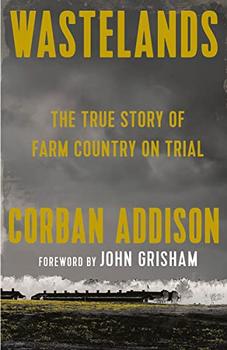Summary | Excerpt | Reviews | Beyond the Book | Readalikes | Genres & Themes | Author Bio

The True Story of Farm Country on Trial
by Corban AddisonChapter 1
Homeplace
What is money when I have all the earth?
River Road, Wallace, North Carolina
Summer 1958
On a five-acre plot of sandy loam soil at the hem of a stand of pines lies a house built by hand a few years after the armistice that ended the First World War. The house is painted white, like a bridal veil, though in time the lady of the house, Beulah Stallings Herring, will paint it green and then pink, unlike any in the vicinity—perhaps in all of Duplin County. Not the flamboyant pink of lipstick or roses, nor the translucent pink of skin, but the spring pink of a dogwood flower.
It is a modest dwelling, yet it was constructed to weather the years. Its siding is German Dutch and its bones are likely pine, though precise memory of the framing will soon perish with the builders. The focal point of the house is the porch. It encompasses the structure's entire front face, including the door. To the visitor it signals a welcome, an invitation to sit and stay awhile, to breathe the sweet country air and trace the shape of the clouds.
Though it is solitary, the house is almost never alone. It is the birthplace of fifteen children, all born to Beulah Herring across a quarter of a century. Her first child was old enough to vote by the time the baby, Elsie, came along. Elsie is ten years old now, and though she is the youngest, she is a precocious child, strong-willed and opinionated. One Sunday afternoon in July, she walks through the kitchen, the living room, and out the front door of the house as if she knows that one day it will be her own.
"Come on, Beef, let's go," she says, taking the hand of her brother Jesse and tugging him through the knot of adults sitting on the porch, enjoying the shade and the breeze.
Her father is in one of the rocking chairs, as is her Uncle Perl, and a neighbor from down the road. They are talking about the tobacco market and the harvest yet to come. They pay Elsie no mind. The afternoon meal is still a ways off, and they trust her to bring Jesse back in time.
Down the steps and out into the yard Elsie strolls, Jesse at her heels. While Jesse is older than Elsie by two years, he is smaller than most twelve-year-olds, his growth attenuated by Down syndrome. On account of their birth order and Jesse's special needs, they have been close for as long as Elsie can remember. To her, he's "Beef," and to him, she's "Elt." Only one person in the world inspires greater affection in Jesse than Elsie does—their mama.
At this moment, Beulah is straightening clothes on the line. Even at the age of fifty-six, she is still a remarkably youthful woman, her gentle demeanor balanced by penetrating wisdom and unflappable resolve. She is Elsie's favorite person, too. It is Beulah's spirit more than any other that gives shape to their family. Her smile means Elsie is home.
"Where y'all headed?" she asks, as if already knowing the answer.
"Just going for a walk," Elsie replies with a grin.
A couple of Elsie's siblings are lounging on chairs in the yard beneath a sprawling tree whose canopy is wide enough to swallow the Carolina sun. Elsie catches the eye of her sixteen-year-old sister, Thelma, and tosses her a languid wave. Thelma's twin brother, Delma, is beside her, sipping Coca-Cola and chatting with a friend. After Thelma waves back, Elsie leads Jesse around to the side of the house and back toward the smokehouse and the gardens beyond it.
The land opens up before her in the hues of emerald and henna, as does the sky in celestial blue. It is her mother's land, all eighty acres of it, just as it was her granddaddy's until he passed on to his reward shortly before Beulah gave birth to her first baby. Elsie knows her granddaddy, Immanuel, through the stories her mother has told her. Those stories are Elsie's inheritance, too, and Jesse's and Thelma and Delma's. Like the land itself, they are a memorial to their family's place in the world.
Excerpted from Wastelands by Corban Addison. Copyright © 2022 by Corban Addison. All rights reserved. No part of this excerpt may be reproduced or reprinted without permission in writing from the publisher.
Your guide toexceptional books
BookBrowse seeks out and recommends the best in contemporary fiction and nonfiction—books that not only engage and entertain but also deepen our understanding of ourselves and the world around us.